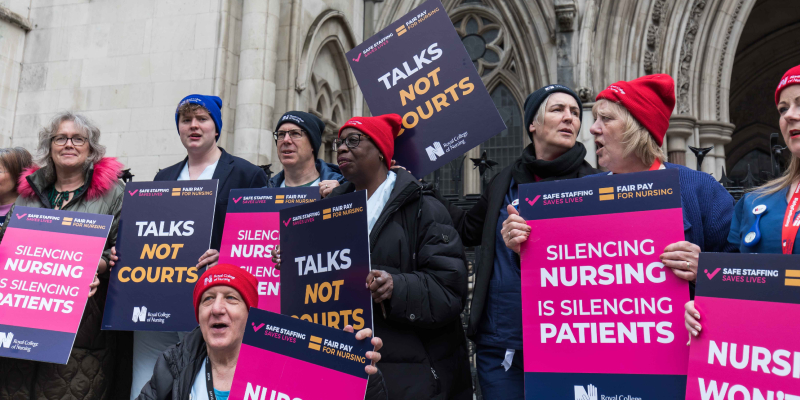This latest 28-hour strike comes ahead of a crucial meeting between a number of health unions, ministers and NHS bosses…reports Asian Lite News
Nurses in England are taking part in a fresh strike, in what it has described as its biggest walkout so far. The Royal College of Nursing strike affects half of England’s NHS trusts and will last until midnight on Monday.
It is the first time some nurses who work in A&E, intensive care and cancer services have joined the picket lines – although the union has agreed staff can be called in for some critical areas. The government says the strike will be incredibly disruptive for patients.
This latest 28-hour strike comes ahead of a crucial meeting between a number of health unions, ministers and NHS bosses on Tuesday, when the government’s pay offer of 5% will be discussed.
The RCN previously rejected the government’s pay offer and announced this new strike, which is their third this year in the dispute over pay, recruitment and retention in the NHS.
Health Secretary Steve Barclay described the RCN’s decision to press ahead with its strike as “premature” and disrespectful to other unions taking part in the meeting.
Members of the Unite union at some NHS trusts and ambulance services in England are also taking part in strike action on Monday and Tuesday, after also voting to reject the latest pay offer.
NHS England said the strike was the largest industrial action so far and warned patients to expect “disruptions and delays to services over the strike period”.
It warned that staffing levels for some areas would be “exceptionally low, lower than on previous strike days” and the number of rescheduled appointments as a result of strike action was due to hit half a million next week.
However, it said discussions over the weekend had secured “a number of national agreements” to ensure staff could provide care “to protect life and limb services”.
These will cover intensive care units, including for neonatal and paediatric care, as well as major trauma and resuscitation units.
A spokesperson for the RCN, which represents two-thirds of UK nurses, told the BBC that a “national agreement was reached on raising staffing levels in some key areas to preserve life and limb”.
This means a small number of RCN members will be asked to work to provide a minimum standard of cover and meet the legal requirement on trade unions for life-and-limb cover to be provided.
The RCN also added that this strike would be “more intense” than previous ones. Ministers and NHS chiefs had previously warned patient safety would be put at risk.
On Sunday, Health Secretary Barclay said the strikes would put “more pressure on the NHS and will be incredibly disruptive for patients”.
Doctor Jacob Mushlin, an accident and emergency consultant at Bradford Royal Infirmary, said the absence of nurses would create delays and lower the standard of treatment at his hospital and across the country.
“The nurses provide a vital service and one that can’t be replaced by other members of staff,” he said. “We’re going to find that we’re going to be unable to provide anything other than life or limb preserving care.”
Dr Mushlin also said he had seen a rising number of cases of “dreadful” aggression and violence towards hospital staff increasing because of long waiting times in the NHS, which was severely impacting morale. The walkout by RCN members started at 20:00 BST on Sunday and will end at midnight on Monday.
It was originally supposed to continue into Tuesday but a High Court judge ruled it would be unlawful because a six-month mandate for action had expired.
Last week, the British succeeded in limiting the length of an upcoming strike by nurses, after the health department took legal action against a trade union.
Lawyers representing health minister Steve Barclay told London’s High Court on Thursday that, as the RCN ballot closed on Nov. 2 last year, a strike on May 2 would be “clearly unlawful action”. The RCN did not send lawyers to the hearing.
Judge Thomas Linden ruled on Thursday that the RCN’s mandate for industrial action ended at midnight on May 1, meaning its planned strike the following day would be unlawful.
Barclay welcomed the ruling, saying the government had taken the RCN to court “with regret”.
“I firmly support the right to take industrial action within the law, but the government could not stand by and let plainly unlawful strike action go ahead,” he said in a statement.
Nurses have rejected a 5% pay rise, despite the RCN recommending its members accept it, instead seeking an increase nearer to inflation which is running at more than 10%.
RCN General Secretary Pat Cullen described the legal action as “the darkest day of this dispute so far”, accusing the government of “taking its own nurses through the courts in bitterness at their simple expectation of a better pay deal”.
“Nursing staff will be angered but not crushed by today’s interim order,” she said in a statement. “It may even make them more determined to vote in next month’s re-ballot for a further six months of action.”

Leave a Reply